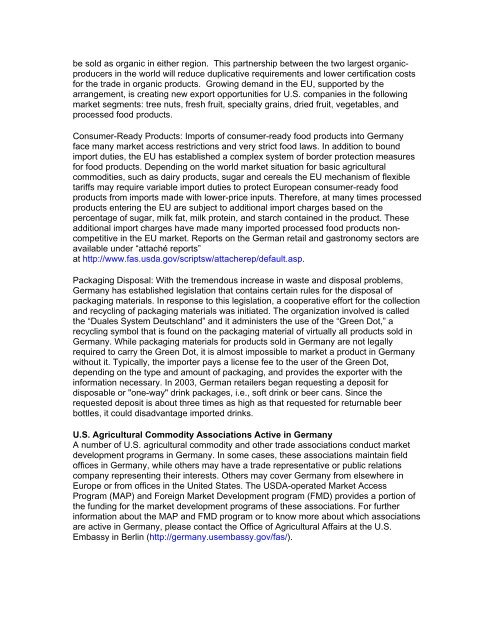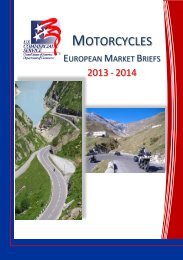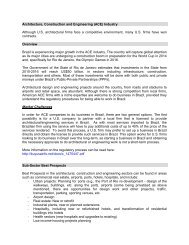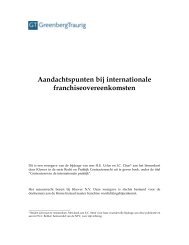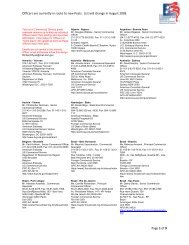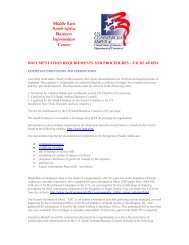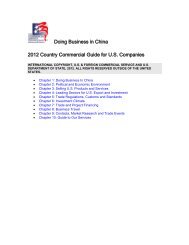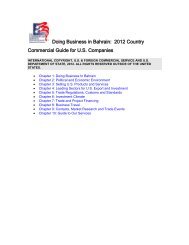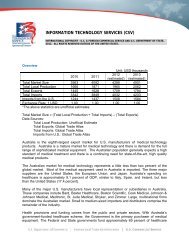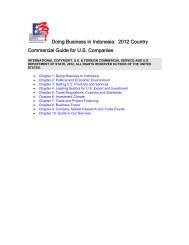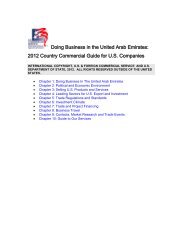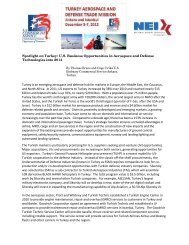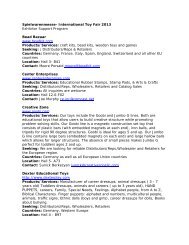Doing Business In Germany: A Country Commercial ... - Export.gov
Doing Business In Germany: A Country Commercial ... - Export.gov
Doing Business In Germany: A Country Commercial ... - Export.gov
You also want an ePaper? Increase the reach of your titles
YUMPU automatically turns print PDFs into web optimized ePapers that Google loves.
e sold as organic in either region. This partnership between the two largest organicproducers<br />
in the world will reduce duplicative requirements and lower certification costs<br />
for the trade in organic products. Growing demand in the EU, supported by the<br />
arrangement, is creating new export opportunities for U.S. companies in the following<br />
market segments: tree nuts, fresh fruit, specialty grains, dried fruit, vegetables, and<br />
processed food products.<br />
Consumer-Ready Products: Imports of consumer-ready food products into <strong>Germany</strong><br />
face many market access restrictions and very strict food laws. <strong>In</strong> addition to bound<br />
import duties, the EU has established a complex system of border protection measures<br />
for food products. Depending on the world market situation for basic agricultural<br />
commodities, such as dairy products, sugar and cereals the EU mechanism of flexible<br />
tariffs may require variable import duties to protect European consumer-ready food<br />
products from imports made with lower-price inputs. Therefore, at many times processed<br />
products entering the EU are subject to additional import charges based on the<br />
percentage of sugar, milk fat, milk protein, and starch contained in the product. These<br />
additional import charges have made many imported processed food products noncompetitive<br />
in the EU market. Reports on the German retail and gastronomy sectors are<br />
available under “attaché reports”<br />
at http://www.fas.usda.<strong>gov</strong>/scriptsw/attacherep/default.asp.<br />
Packaging Disposal: With the tremendous increase in waste and disposal problems,<br />
<strong>Germany</strong> has established legislation that contains certain rules for the disposal of<br />
packaging materials. <strong>In</strong> response to this legislation, a cooperative effort for the collection<br />
and recycling of packaging materials was initiated. The organization involved is called<br />
the “Duales System Deutschland” and it administers the use of the “Green Dot,” a<br />
recycling symbol that is found on the packaging material of virtually all products sold in<br />
<strong>Germany</strong>. While packaging materials for products sold in <strong>Germany</strong> are not legally<br />
required to carry the Green Dot, it is almost impossible to market a product in <strong>Germany</strong><br />
without it. Typically, the importer pays a license fee to the user of the Green Dot,<br />
depending on the type and amount of packaging, and provides the exporter with the<br />
information necessary. <strong>In</strong> 2003, German retailers began requesting a deposit for<br />
disposable or "one-way" drink packages, i.e., soft drink or beer cans. Since the<br />
requested deposit is about three times as high as that requested for returnable beer<br />
bottles, it could disadvantage imported drinks.<br />
U.S. Agricultural Commodity Associations Active in <strong>Germany</strong><br />
A number of U.S. agricultural commodity and other trade associations conduct market<br />
development programs in <strong>Germany</strong>. <strong>In</strong> some cases, these associations maintain field<br />
offices in <strong>Germany</strong>, while others may have a trade representative or public relations<br />
company representing their interests. Others may cover <strong>Germany</strong> from elsewhere in<br />
Europe or from offices in the United States. The USDA-operated Market Access<br />
Program (MAP) and Foreign Market Development program (FMD) provides a portion of<br />
the funding for the market development programs of these associations. For further<br />
information about the MAP and FMD program or to know more about which associations<br />
are active in <strong>Germany</strong>, please contact the Office of Agricultural Affairs at the U.S.<br />
Embassy in Berlin (http://germany.usembassy.<strong>gov</strong>/fas/).


